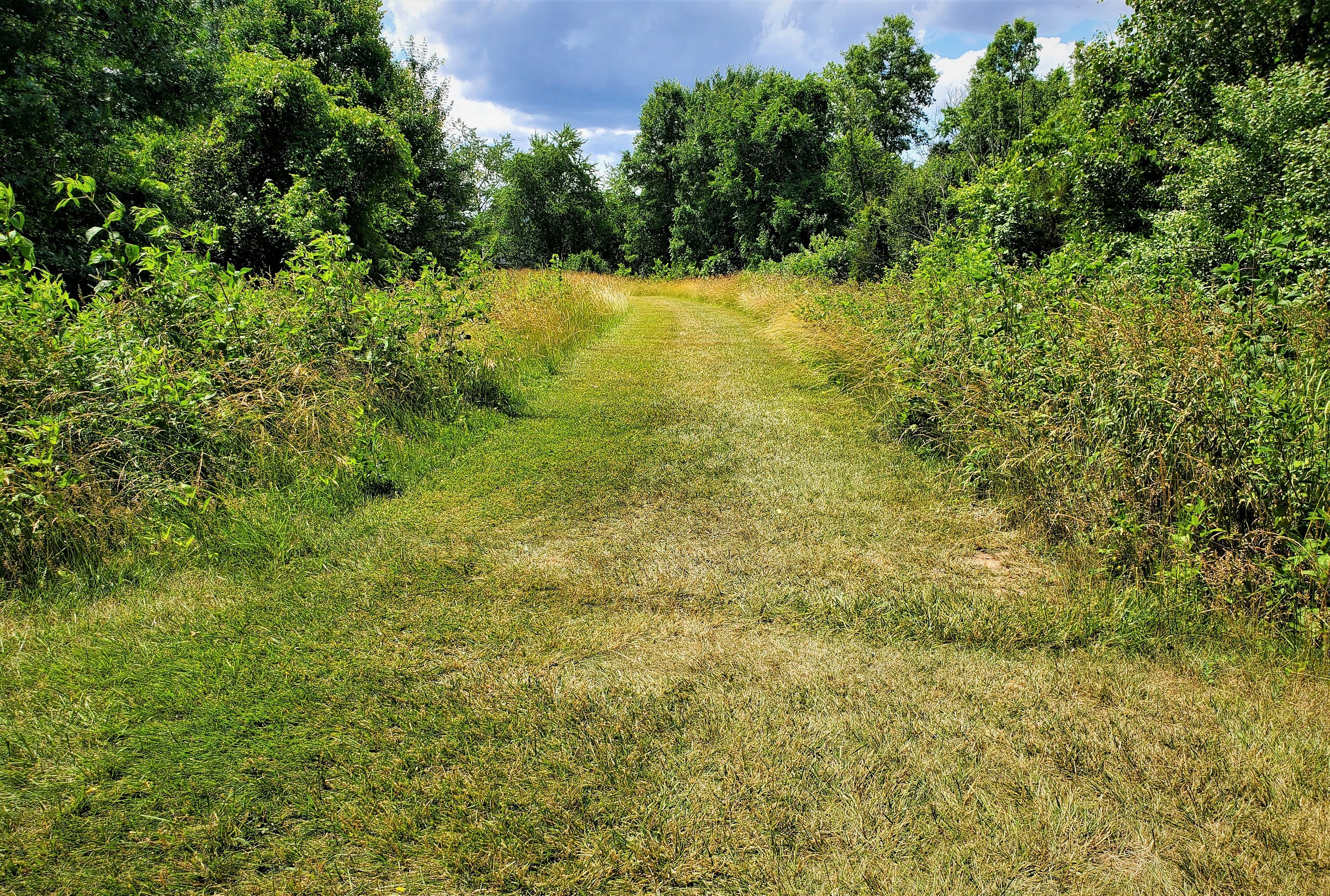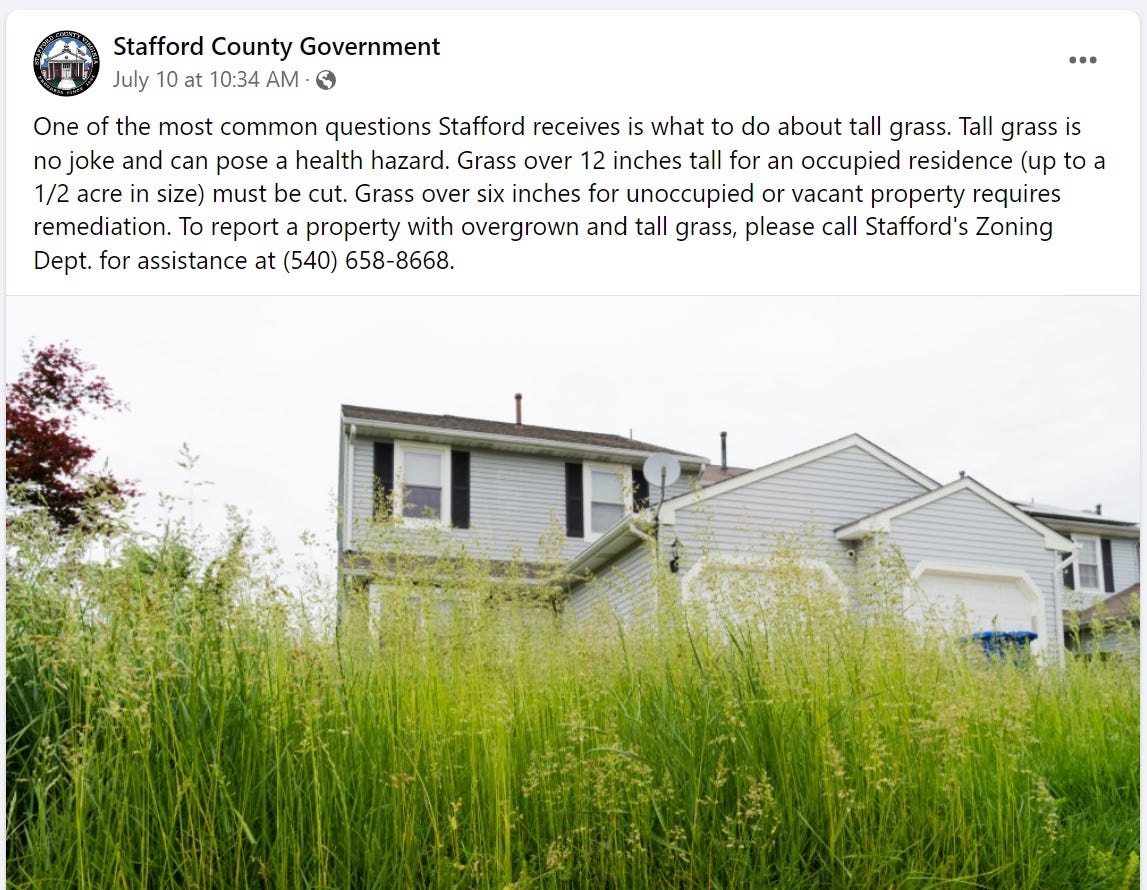The Deleted Scenes - A Lawn Is a Suburb
Recently I saw two images. One was this path mowed through tall grass not far from my house: The other was this post from a Virginia county government my wife showed me on Facebook: Now I’ve seen tall grass before. And, of course, I’ve seen freshly cut grass. Now that I have a little lawn, I cut the grass every week. But—maybe with my “urbanist perception” turned on—that photo I took of the path through the grass struck me. The actual plants that make up the cut-grass path and the tall brush around it are the same. The more varied, visually diverse brush is what grass grows up into. What we call “grass” or “lawn” is grass not permitted to grow or mature. In other words, what we think of as grass doesn’t exist in nature except as a stage in a lifecycle. I don’t think this ever explicitly occurred to me before. I thought of lawn grass and tall, wild grass as two different kinds of plants, even though I knew they really weren’t. I never really thought about the fact that a lawn is grass, stunted. Which makes me think about suburbia. Last year, in a long piece for Vox, I wrote about the evolution of the suburbs into more densely populated, culturally diverse places nonetheless distinct from the city. Towards the end, I made this analogy, comparing suburbia to a “first draft”:
I made this argument in the piece, and have continued to make it in different ways—for example, here—that in some ways there is really only kind of urban settlement. What we call “towns” and “cities”, and maybe even “suburbs”, are just urban places in various states of maturity or growth. A town is a small urban settlement; a city is a large one. And a suburb is one that has not been allowed to grow up. In other words, a suburb is not a type of place; it’s just the initial stage of what would eventually become a city, artificially frozen in time, encased in regulatory amber. A suburb, in other words, is a lawn. Maybe this is a bit of a stretch. But am I crazy for thinking there might be some underlying conceptual similarity between how short grass—stunted grass—is automatically seen as good, and how people oppose density and growth in their neighborhoods? Is there any conceptual similarity between the diversity of a field or meadow allowed to grow, and a human settlement allowed to grow? Now “diversity” is one of those words that gets coded as politically correct or lefty or whatever. But the thing that strikes me about Northern Virginia—and that my mother remembers about New York City—is how unselfconscious the diversity is. Nobody walks around saying “I interacted with a person of a different skin color today!” It’s just the way it is. It’s ordinary, but also kind of remarkable. When a place grows, there’s more room for everyone. Our ideas and rules about land use—from where homes are allowed to go, and how many are allowed to be built, all the way down to the characterization of tall grass as a health hazard and the apparent ban on natural meadows in a place like Stafford County—privilege a rigid, narrow, and expensive idea of order. Charles Marohn of Strong Towns calls the suburban development pattern “orderly but dumb,” in contrast to the naturally occurring, bottom-up “chaotic but smart” ethos of traditional urban development. What urbanism has made it possible for me to do is discern, or perceive, the ideology concealed under seemingly dry and arcane things like zoning codes and grass-cutting ordinances. Single-family zoning, or the preference for lawns over meadows, are at their heart not matters of public health or public order, but social engineering. There are so many ways in which these rules have produced anomalous outcomes and squeezed out or rendered suspicious what would be, in other contexts, completely natural human behavior. In many ways we’ve engineered an environment which turns human activity and natural, organic growth and maturity into a nuisance: an environment which we must serve by stunting a part of the world and a part of ourselves. Related Reading: Thank you for reading! Please consider upgrading to a paid subscription to help support this newsletter. You’ll get a weekly subscribers-only post, plus full access to the archive: over 700 posts and growing. And you’ll help ensure more material like this! You're currently a free subscriber to The Deleted Scenes. For the full experience, upgrade your subscription. |
Older messages
There Was An Old Woman Who Lived in a House
Monday, August 14, 2023
What Do You Think You're Looking At? #122
You Dropped This, King Farm
Monday, August 14, 2023
Can we still create beautiful places? Look in Rockville, Maryland
It Doesn't Have To Be For You
Monday, August 14, 2023
Thoughts on the "philosophy of urbanism"
New and Old #122
Monday, August 14, 2023
Friday roundup and commentary
And Time Goes On
Monday, August 14, 2023
The joy of life in cycles
You Might Also Like
*This* Is How To Wear Skinny Jeans Like A Fashion Girl In 2025
Wednesday, March 12, 2025
The revival is here. The Zoe Report Daily The Zoe Report 3.11.2025 This Is How To Wear Skinny Jeans Like A Fashion Girl In 2025 (Style) This Is How To Wear Skinny Jeans Like A Fashion Girl In 2025 The
The Best Thing: March 11, 2025
Tuesday, March 11, 2025
The Best Thing is our weekly discussion thread where we share the one thing that we read, listened to, watched, did, or otherwise enjoyed recent… ͏ ͏ ͏ ͏ ͏ ͏ ͏ ͏ ͏ ͏ ͏ ͏ ͏ ͏ ͏ ͏ ͏ ͏ ͏ ͏ ͏ ͏ ͏ ͏ ͏ ͏ ͏ ͏
The Most Groundbreaking Beauty Products Of 2025 Are...
Tuesday, March 11, 2025
Brands are prioritizing innovation more than ever. The Zoe Report Beauty The Zoe Report 3.11.2025 (Beauty) The 2025 TZR Beauty Groundbreakers Awards (Your New Holy Grail Or Two) The 2025 TZR Beauty
Change Up #Legday With One of These Squat Variations
Tuesday, March 11, 2025
View in Browser Men's Health SHOP MVP EXCLUSIVES SUBSCRIBE Change Up #Legday With One of These Squat Variations Change Up #Legday With One of These Squat Variations The lower body staple is one of
Kylie Jenner Wore The Spiciest Plunging Crop Top While Kissing Timothée Chalamet
Tuesday, March 11, 2025
Plus, Amanda Seyfried opens up about her busy year, your daily horoscope, and more. Mar. 11, 2025 Bustle Daily Amanda Seyfried at the Tory Burch Fall RTW 2025 fashion show as part of New York Fashion
Paris Fashion Week Is Getting Interesting Again
Tuesday, March 11, 2025
Today in style, self, culture, and power. The Cut March 11, 2025 PARIS FASHION WEEK Fashion Is Getting Interesting Again Designs at Paris Fashion Week once again reflect the times with new aesthetics,
Your dinner table deserves to be lazier
Tuesday, March 11, 2025
NY delis are serving 'Bird Flu Bailout' sandwiches.
Sophie Thatcher Lets In The Light
Tuesday, March 11, 2025
Plus: Chet Hanks reaches new heights on Netflix's 'Running Point.' • Mar. 11, 2025 Up Next Your complete guide to industry-shaping entertainment news, exclusive interviews with A-list
Mastering Circumstance
Tuesday, March 11, 2025
“If a man does not master his circumstances then he is bound to be mastered by them.” ͏ ͏ ͏ ͏ ͏ ͏ ͏ ͏ ͏ ͏ ͏ ͏ ͏ ͏ ͏ ͏ ͏ ͏ ͏ ͏ ͏ ͏ ͏ ͏ ͏ ͏ ͏ ͏ ͏ ͏ ͏ ͏ ͏ ͏ ͏ ͏ ͏ ͏ ͏ ͏ ͏ ͏ ͏ ͏ ͏ ͏ ͏ ͏ ͏ ͏ ͏ ͏ ͏ ͏ ͏ ͏ ͏ ͏
Don't Fall for This Parking Fee Scam Text 🚨
Tuesday, March 11, 2025
How I Use the 'One in, One Out' Method for My Finances. You're not facing any fines. Not displaying correctly? View this newsletter online. TODAY'S FEATURED STORY Don't Fall for the

